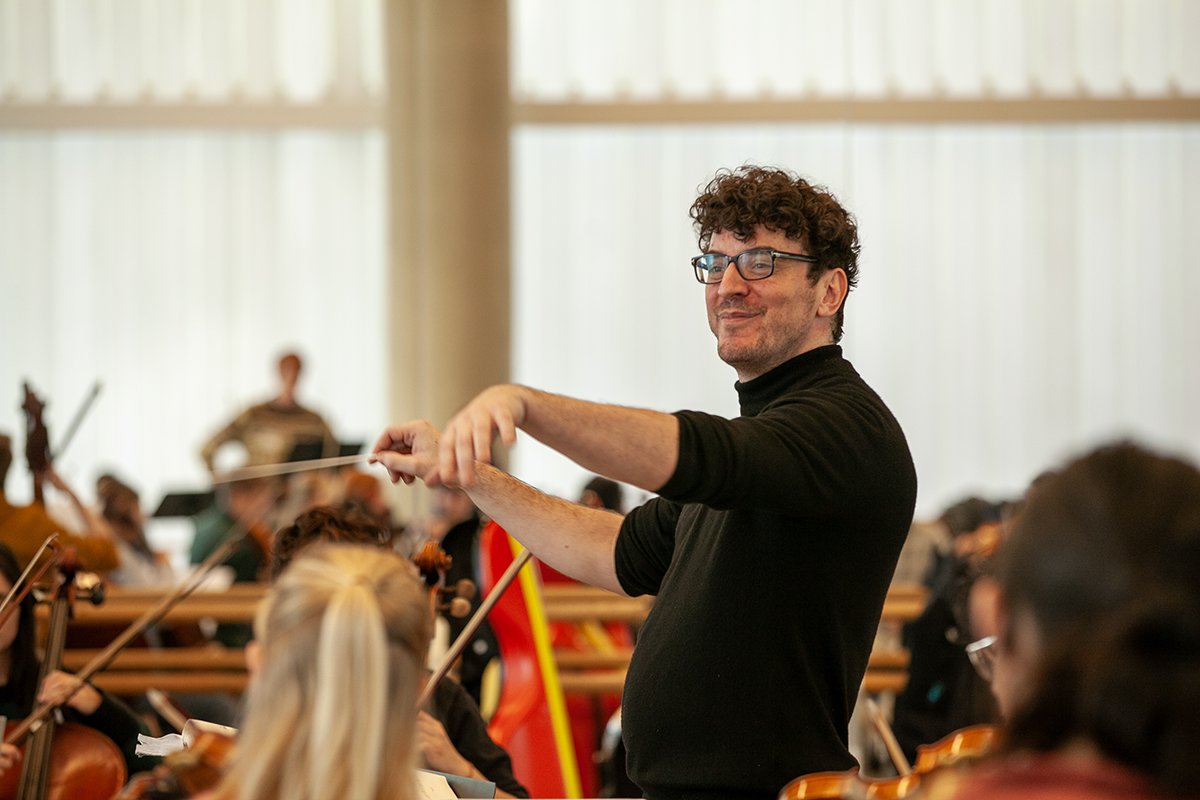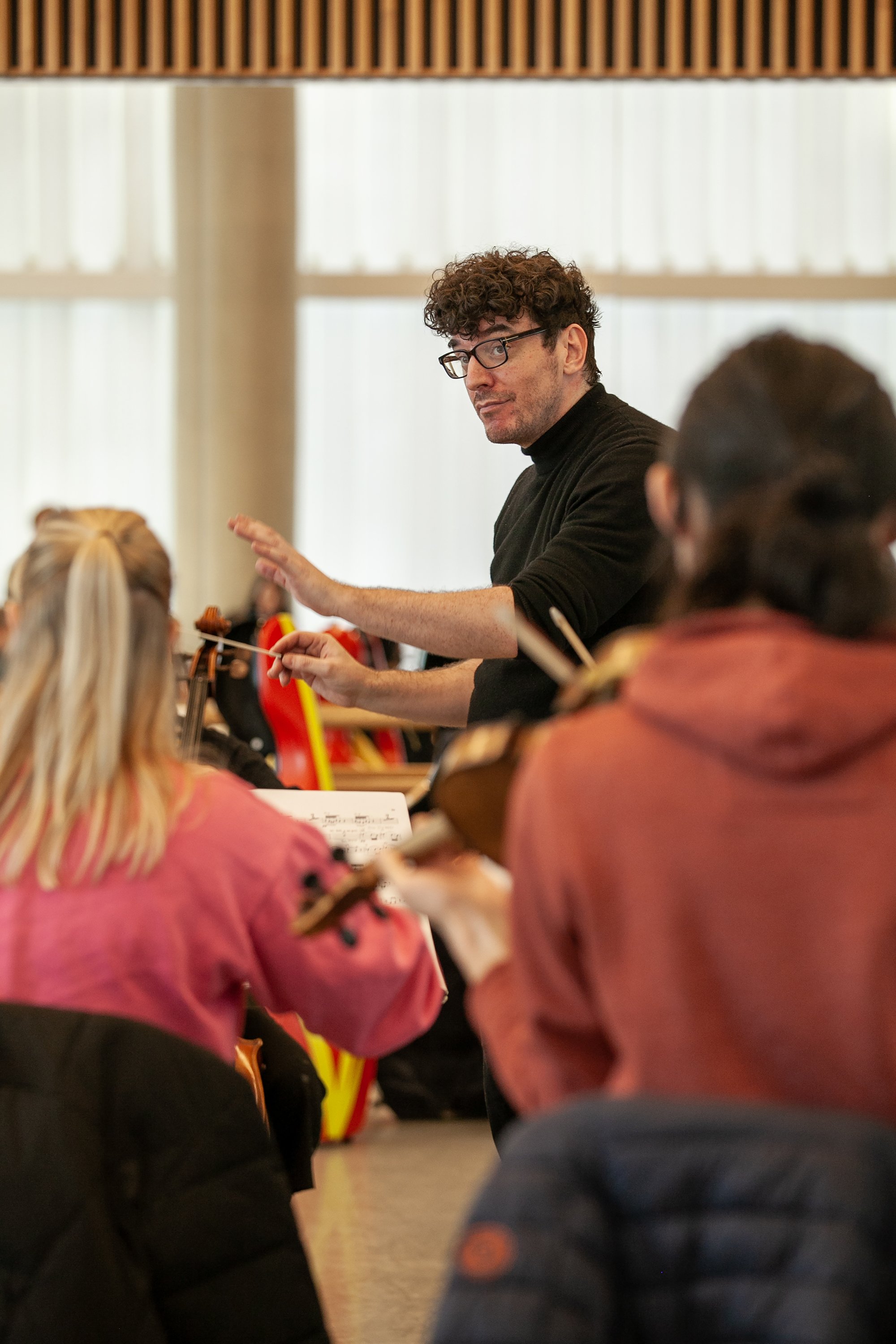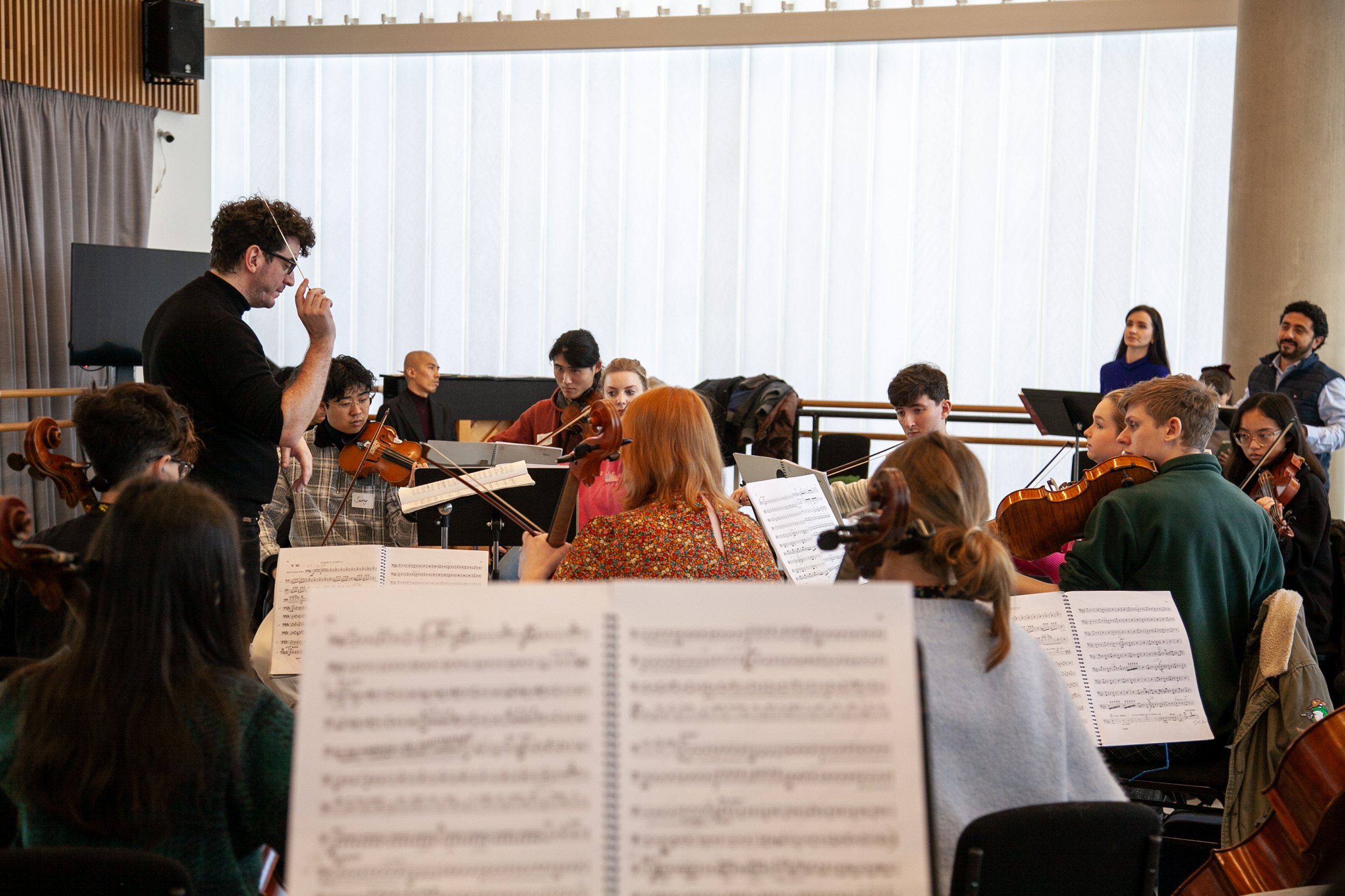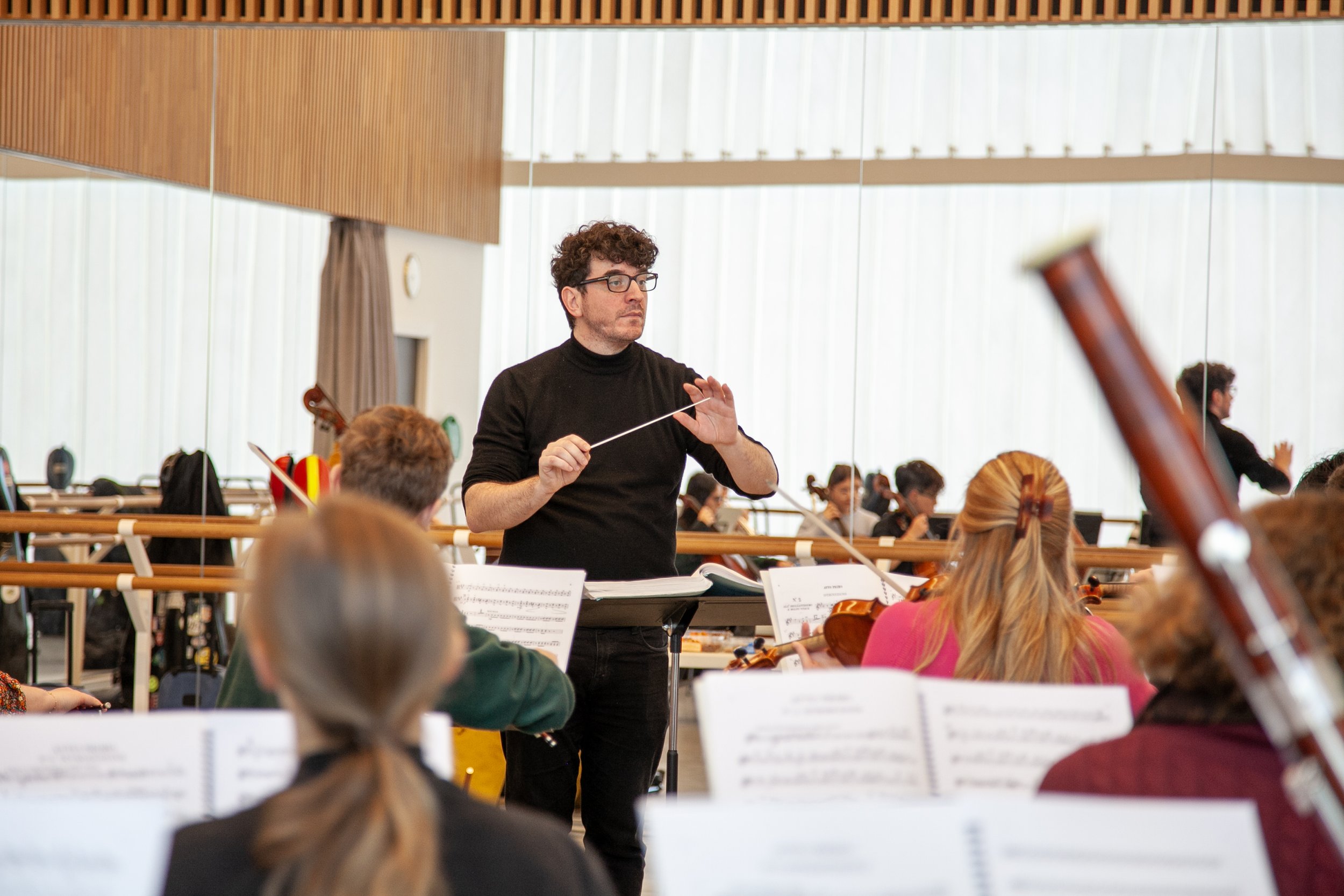The Role of an Opera Conductor - Through the Eyes of Benjamin Hamilton
Following on from two thrilling Opera in a Day workshops held at English National Ballet’s Mulryan Centre for Dance - Hannah catches up with maestro Benjamin Hamilton, on the role of an opera conductor.
Hey Ben! Can you share a bit about your journey to becoming an opera conductor? What inspired you to pursue this path?
I came to conducting quite late. Having studied violin since I was young, I first pursued a ‘sensible’ university career at Warwick. I stayed on to read for a PhD—not because of the studying, but because of the music-making. This was the best decision I ever made as it exposed me to a wealth of music-making with joy at its heart that I keep in everything I do to this day – give 100% because you never know what will happen and you can always find the joy in it!
My first conducting gig was quite serendipitous. I was brought in to rescue the finances of a failing opera society (being a Maths student!). We aimed to put on a profitable Gilbert and Sullivan opera with friends. During auditions, it became clear that we had no tenors, and our musical director, an excellent light tenor, needed to sing the role. I stepped in to run the music side of things (probably very badly!), but by the end, I was absolutely smitten.
I’m so grateful for my unconventional path into conducting because it’s allowed me to stay true to that feeling of excitement. For me, it has always been about being the glue that helps make something happen with a fantastic group of talented people—what a buzz!
What are some of the most significant influences in your career as a conductor?
Wow! That’s hard to narrow down. If I had to answer with three words, I’d say joy, community, and storytelling. They all boil down to the same thing, ultimately, but when considering whether to pursue a project, these are always at the heart: will it build community, who will it bring joy to, and how can we maximise the element of storytelling? Opera is a brilliant vehicle for doing this (and my favourite!), but you can find these things in a concert program with an amateur orchestra, in a classroom where a child meets fantastic music for the first time, or in a workplace choir workshop.
In terms of my influences, there are too many people to thank by name, but I would say I wouldn’t have started without the faith shown in me by many mentors and supporters over the years. The first was Paul McGrath at Warwick, who pushed for me to conduct my first opera in the Warwick Arts Centre Theatre and then supported my journey as I “learned by doing” through over a dozen operas there. Since then, many brilliant people have imparted a golden nugget of their way into my practice – and I’m always learning!
Can you explain the primary responsibilities of a conductor in an opera production? & How does the role of a conductor in opera differ from that in other musical settings like symphonic concerts or choral performances?
No! Well, maybe. Opera productions are like a symphonic concert or choral performance in so far as you have to know and care about the music and the journey you’re taking the artists and audience on. However, an opera also has a huge number of additional moving parts. I think the primary responsibility of a conductor is to keep those parts always aligned and working together!
When you conduct an opera, you’re privileged to be working on some exceptional music with exceptional artists – both singers and instrumentalists, but also stage directors, stage management, designers, costumiers, and lighting designers. These brilliant people bring decades of experience to every minute of opera we watch – and they’re all there, ultimately, to move the audience with storytelling. It’s the conductor’s job to help shine a light on that artistry and to facilitate its shining. George Hurst used to say, “Look after the little notes and the rest follows” – this endorsement of caring about the small details and making the bigger whole better has stuck with me for some years, and I try to live by it!
I remember fondly a fantastic "The Only Way is Essex" setting of Cinderella, complete with Gok-Wan as a TV-presenting fairy godmother and an aria about how [Nando's endorsed!] "Extra-Hot" Cinderella was. As you can imagine, such a production was incredibly visual, and a particularly fun moment was having to conduct while Gok-Wan and his entourage of TV cameras were filming in the orchestra pit! That, and rescuing the famous shoe when it fell into the pit whilst still conducting. Opera is entirely unpredictable but all the more magical for it!
How do you prepare for an opera production? What steps do you take from receiving the score to the opening night?
A fantastic question – of course, it depends on the production, but simply stated, I extend George’s quote from above. I try to become as knowledgeable as possible about every aspect of the opera, its history, the plans for the current production and, of course, the music. It’s amazing how those small details can really help to get ‘under the skin’ of a work!
Then, actual rehearsals begin! There are music rehearsals, staging rehearsals, orchestral rehearsals, and finally, the rehearsals where everything is put together. There’s a sitzprobe (where the singers and orchestra meet for the first time), a stage and piano (where we sing in the space for the first time), and if we’re lucky, a stage and orchestra (where everything comes together for the first time). For me, it is this rehearsal, or the dress that follows it, where the magic of opera really comes to the fore—the hard work of many people comes together, hopefully like a well-oiled machine.
I could write a book on these stages, but the most important part is to know your stuff, yet at each stage remain flexible and open to new ideas by building on that knowledge. For example, with DEBUT, we did an opera-in-a-day version of "La Bohème" a couple of months ago. These days are fantastic fun, but ultimately, how well it goes is down to how well-prepared I am. I am lucky to have conducted "La Bohème" several times (coincidentally first with Lizzie Holmes, DEBUT’s founder, when we were both students!). I still use my score from that time, and in preparing for the day, I found a big “?” above a bar that I’ve never quite worked out my ‘right way’ to navigate. I was doing a coaching session with one of the fantastic singers, and they asked me which way I would like that bar, sang it two ways—one the ‘traditional’ approach and one ‘their’ approach—and wow, their idea just worked. So I guess what I’m saying is that from start to finish, preparation, preparation, preparation is key, provided you’re then open to changing your mind when working with other artists. By which time, it’s opening night...
What are some of the biggest challenges you face during a live opera performance?
By the time you’re at opening night, you’ve made all the decisions you can, you know the show, and you’re going to do everything you can to share the artistry of the production and its artists with the audience. That’s a big task, and sometimes things can go wrong! There are the usual momentary lapses where a line comes in in the wrong place, but I still chuckle, remembering one moment when things went awry.
I was conducting a "Hansel and Gretel" in a modern production by fantastic director Felicity Green at the Belgrade Theatre, and one night, the smashing of the ‘milk jug’ which leads to Hansel and Gretel running into the forest, happened a full three minutes early. The next scene was about how precious the (now smashed!) jug was and how they looked forward to drinking the milk. As it became clear that brilliant Alexa Mason, singing Gretel, was rewriting the words in her head to help it make sense live, I slowed the tempo to give her some space to think, and by the end of the scene, I’m not sure anyone watching would have been any the wiser. It still makes me smile because she even made the lines rhyme—absolute genius! Knowing the score, trusting the artists, and a bit of teamwork meant the magic of the theatre continued.
And finally - what advice would you give to aspiring conductors who want to work in opera?
Find your thing. Yes, listen to mentors, learn all you can, and don’t reinvent the wheel for the sake of it—the nuggets of good ideas you collect will serve you well. BUT: ensure that you’re always presenting the authentic you—there’s nothing better for the other artists in the room, the audience, or the story. Good luck!
Photos by Jenny Aston @silverapplesuk








Lizzie (DEBUT’s founder) and Benjamin cut their teeth together at the University of Warwick (where they met), working on productions of Figaro, Bohème, Hansel and Gretel and Flute. We felt that this was something that was needed for emerging professional musicians, and a great way to get the wider community involved too.